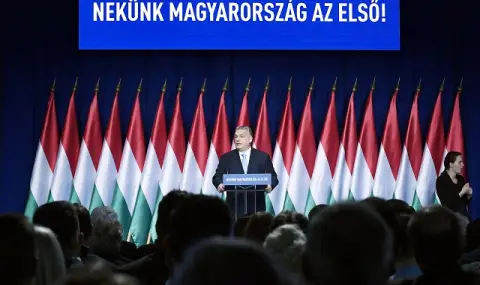Viktor Orban's Hungarian opposition opponent Peter Magyar said he would maintain strong ties with the EU and NATO if he wins elections in early 2026 and would seek "pragmatic relations" with Russia, Reuters reported, quoted by BTA.
Magyar's center-right TiSA party emerged on the Hungarian political scene last year and has mounted the most serious challenge to Orban since he came to power in 2010. Recent polls show Magyar’s popularity is rising, with Tisza leading Orban’s Fidesz party.
Some EU leaders have criticized Orban for his government’s ties to Russia and his opposition to military aid to Ukraine, Reuters reported. His government is trying to revive the country’s economy after an inflationary shock.
Tisza’s dynamic leader, Magyar, is a former Orban government insider. He has said he would unblock billions of euros in frozen European funds to shore up the economy and take serious steps to curb corruption.
He has also said he would join the European prosecutor’s office – a move rejected by Budapest’s nationalist government, embroiled in a dispute with Brussels over the rule of law. The dispute has cost Hungary access to vital European funds.
“We are a member of the EU, this club, and a member of NATO… of course, this is an open economy and we have to be on good terms with other powers… and eastern ties are also important, but right now we sell about 80% of our goods on the EU market“, Magyar said.
He said his party would run in the elections independently and ruled out an alliance with other opposition parties.
Magyar also said his approach to Russia would be “pragmatic.“I don't think there are friendships in politics… that there is an Orban-Trump friendship or an Orban-Putin friendship. There are interests and it is right for state leaders to represent the interests of their countries… "This requires allies, but these should be alliances based on values," he added.
“I believe that the "Paks” (nuclear) project cannot be stopped… This is an international treaty, we can negotiate many aspects of it, such as financing, because there are unprofitable parts there, so refinancing could be possible. "We need to negotiate pragmatically," said Magyar regarding Orban's joint project to build a nuclear power plant with the Russian company "Rosatom."
He added that his government would adopt a similar position towards China.
"A country can be sovereign, truly independent, if it has a strong economy... if it does not rely on Chinese loans or Russian influence or "aid," but stands on its own two feet," concluded Magyar.
